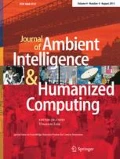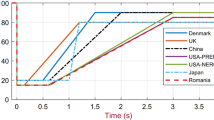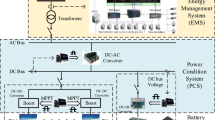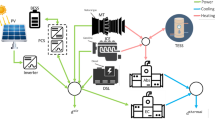Abstract
This paper utilizes the Karush–Kuhn–Tucker (KKT) conditions to develop a scheme for economic dispatch of load to generation units in a microgrid. By using the (pure) KKT conditions, the true optimum can be found in the sense of minimizing the fuel consumption. This is the most economic way of dispatching the load to generators, but it may not be directly applicable in the real world. In practice extra constraints, in the form of swing generator(s), base load generator upper and lower operating limits, and spinning reserve are also required. These lead to a set of constrained KKT conditions, which are utilized to solve the problem. Note that although this solution obtained from constrained KKT conditions is not the true optimum, the extra constraints are there to enhance the system stability and reliability.This new approach is tested extensively in simulation against standard dispatch approaches, and its performance is seen to be superior in all cases.

























Similar content being viewed by others
References
Agarwal Y, Weng T, Gupta R (2011) Understanding the role of buildings in a smart microgrid. In: Design. Automation test in Europe conference exhibition (DATE), pp 1–6
Calderaro V, Hadjicostis C, Piccolo A, Siano P (2011) Failure identification in smart grids based on petri net modeling. IEEE Trans Ind Electron 58(10):4613–4623. doi:10.1109/TIE.2011.2109335
Camacho E, Samad T, Garcia-Sanz M, Hiskens I (2011) Control for renewable energy and smart grids. The Impact of Control Technology, Control Systems Society, pp 69–88
Casazza J, Delea F (2003) Understanding electric power systems—an overview of the technology and the marketplace. Wiley, New York
Cecati C, Citro C, Piccolo A, Siano P (2011) Smart operation of wind turbines and diesel generators according to economic criteria. IEEE Trans Ind Electron 58(10):4514–4525. doi:10.1109/TIE.2011.2106100
Cecati C, Citro C, Siano P (2011) Combined operations of renewable energy systems and responsive demand in a smart grid. IEEE Trans Sustain Energy 2(4):468–476. doi:10.1109
Chong EKP, Zak SH (2008) An introduction to optimization. Wiley-Interscience Series in Discrete Mathematics and Optimization, 3rd edn. Wiley, New York
Cordaro M (2008) Understanding base load power. What it is and why it matters. New York Affordable Reliable Electricity Alliance (New York AREA)
Del Carpio Huayllas T, Ramos D, Vasquez-Arnez R (2010) Microgrid systems: current status and challenges. In: Transmission and distribution conference and exposition: Latin America (T D-LA), 2010 IEEE/PES, pp 7–12. doi:10.1109/TDC-LA.2010.5762853
dos Santos Coelho L, Mariani VC (2007) Improved differential evolution algorithms for handling economic dispatch optimization with generator constraints. Energy Convers Manag 48:1631–1639
Eyer J, Gorey G (2010) Energy storage for the electricity grid: benefits and market potential assessment guide—a study for doe energy storage systems program. SANDIA, Report SAND2010-0815
Galvin Electricity Initiative (2009) Understanding microgrids. Tech. rep, Galvin Electricity Initiative
Han Y, Young P, Zimmerle D (2011) Optimum generation units dispatch for fuel consumption minimization. In: Proceedings of the 50th IEEE conference on decision and control (to appear)
Han Y, Young P, Zimmerle D (2012) Constrained optimum generator dispatch for fuel consumption minimization. In: Proceedings of the 51st IEEE conference on decision and control (to be submitted )
Hernandez-Aramburo C, Green T, Mugniot N (2005) Fuel consumption minimization of a microgrid. IEEE Trans Ind Appl 41(3):673–681
Kirschen D, Strbac G (2004) Fundamentals of power system economics, 1st edn. Wiley, New York
Lasseter R, Paigi P (2004) Microgrid a conceptual solution. In: IEEE 35th annual power electronics specialists conference, vol 6, pp 4285–4290. doi:10.1109/PESC. 2004.1354780
Li H, Lai L, Qiu R (2010) Communication capacity requirement for reliable and secure state estimation in smart grid. In: 2010 First IEEE international conference on smart grid communications (SmartGridComm), pp 191–196. doi:10.1109/SMARTGRID.2010.5622042
Liao G (2010) Using chaotic quantum genetic algorithm solving environmental economic dispatch of smart microgrid containing distributed generation system problems. In: 2010 international conference on power system technology (POWERCON), pp 1–7. doi:10.1109/POWERCON.2010.5666468
Liu T, Yang Y, Li X, Xing Z, Wang F, Su P, Luo H (2010) Energy saving generation dispatch for sustainable development of energy utilizing in china. In: 2010 Asia-Pacific power and energy engineering conference (APPEEC), pp 1–4. doi:10.1109/APPEEC.2010.5448340,
McDaniel P, McLaughlin S (2009) Security and privacy challenges in the smart grid. IEEE Secur Priv 7(3):75–77. doi:10.1109/MSP.2009.76, http://dx.doi.org/10.1109/MSP.2009.76
Mohsenian-Rad AH, Wong V, Jatskevich J, Schober R (2010) Optimal and autonomous incentive-based energy consumption scheduling algorithm for smart grid. In: Innovative smart grid technologies (ISGT), pp 1–6. doi:10.1109/ISGT.2010.5434752
Moslehi K, Kumar R (2010) A reliability perspective of the smart grid. IEEE Trans Smart Grid 1(1):57–64. doi:10.1109/MSP.2010.49, http://dx.doi.org/10.1109/MSP.2010.49
Ortega-Vazquez MA, Kirschen DS (2007) Optimizing the spinning reserve requirements using a cost/benefit analysis. IEEE Trans Power Syst 22(1):24–33
Rebours Y, Kirschen D (2005) What is spinning reserve? The University of Manchester
Siano P, Chen P, Chen Z, Piccolo A (2010) Evaluating maximum wind energy exploitation in active distribution networks. Gener Transm Distrib 4(5):598–608. doi:10.1049/iet-gtd.2009.0548
US Department of Energy (2008) The smart grid: an introduction. http://www.oe.energy.gov/SmartGridIntroduction.htm
von Meier A (2006) Electric power systems. A conceptual introduction. Wiley, New York
Yoshikawa M, Toshida N, Nakajima H, Harada Y, Tsurugai M, Nakata Y (1997) On-line economic load dispatch based on fuel cost dynamics. IEEE Trans Power Syst 12(1):315–320. doi:10.1109/59.574953
Yuan Z, Hou Z, Jiang C (2002) Economic dispatch and optimal power flow based on chaotic optimization. In: International conference on power system technology, vol 4, pp 2313–2317. doi:10.1109/ICPST.2002.1047238
Author information
Authors and Affiliations
Corresponding author
Rights and permissions
About this article
Cite this article
Han , Y., Young, P. & Zimmerle, D. Microgrid generation units optimum dispatch for fuel consumption minimization. J Ambient Intell Human Comput 4, 685–701 (2013). https://doi.org/10.1007/s12652-012-0158-3
Received:
Accepted:
Published:
Issue Date:
DOI: https://doi.org/10.1007/s12652-012-0158-3




